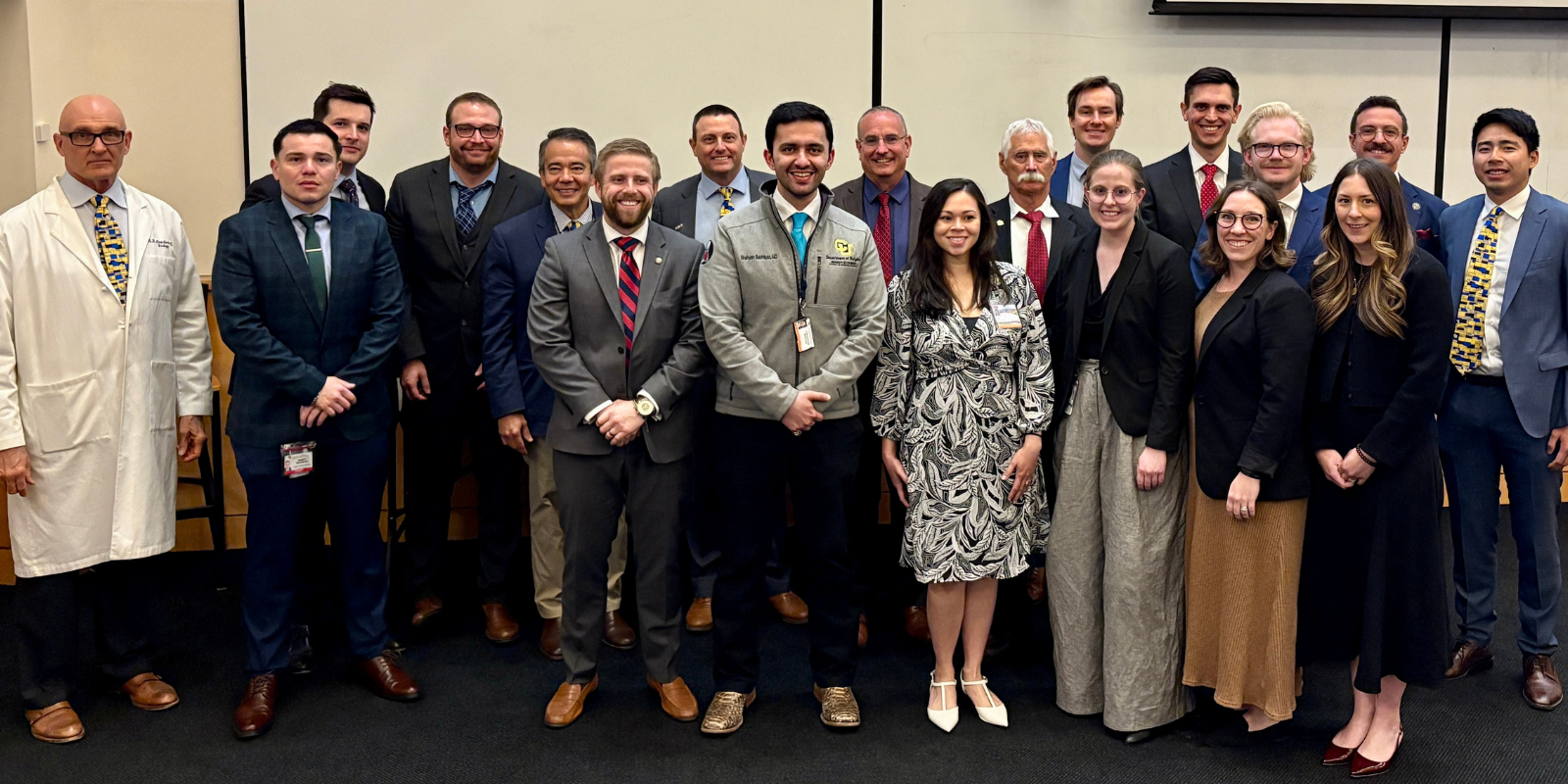Fourteen residents and fellows from the University of Colorado Department of Surgery gave brief presentations on their research at the annual Research Symposium on May 12.
Spotlighting basic and translational research, as well as clinical and health science studies, the symposium showed the depth and breadth of research occurring in the department and included research on such topics as transplant surgery, trauma surgery, sexual health in breast cancer patients, and how social vulnerability increases utilization of urgent surgery procedures.
“We had 14 outstanding research projects presented by our surgical residents,” says Robert Meguid, MD, MPH, FACS, associate vice chair of clinical research in the Department of Surgery. “They spanned a wide range of research, with direct impacts onto our day-to-day patient care as well as shaping future care paradigms and policies.”
From the lab
Among the residents presenting basic and translational research was Caitlin Eason, MD, who spoke about her study of a potential biomarker for congenital diaphragm hernias in infants.
“I’m really inspired by all the hard work my co-residents are doing, so I felt honored to be able to present alongside them,” Eason says. “My research is focused on a niche of pediatric surgery — fetal surgery — so I was excited to share it with a group of general surgeons. Biomarkers are incredible and will change how we stratify the severity of diagnoses and offer interventions. They’re the future of medicine.”
Nicolas Drysdale, MD, presented his research on improving mortality rates for patients undergoing single ventricle heart surgery.
“I was really excited to share our findings,” Drysdale says. “I felt it validated the time I am spending outside of the operating room. More important than being able to do science well is to communicate it well. Many great minds have been overlooked because of their inability to communicate clearly. Sharing my research was great, but feeling like I was understood by my peers was even better.”
Other basic and translational science research featured at the symposium included:
-
Research by Jason Breithaupt, MD, on a way to increase the number of viable hearts for transplant.
-
A paper by Kenneth Meza Monge, MD, on mitigating post-surgical liver injury and neuroinflammation.
-
Research by Benjamin Ramser, MD, on ways to mitigate mitochondrial dysfunction after traumatic injury.
-
A study by Benjamin Stocker, MD, on mitigating trauma-associated endotheliopathy.
-
A paper by Brian (Bo Chang) Wu on a way to ameliorate spinal cord ischemia associated with aortic surgery.
Clinical studies
Clinical and health science researchers presenting at the symposium included Jack Zakrzewski, MD, who spoke about his study on “left-digit bias in heart allocation for transplantation” — a cognitive bias in which clinicians disproportionally focus on a donor’s age when deciding which organs are acceptable for transplant. His research showed that even when the organs are of identical quality, hearts from 50-year-old donors are often rejected, while those from 49-year-old donors are accepted.
“The lack of donor organs, especially hearts, is something that is very important to me, because transplantation is literally giving someone a gift like no other,” Zakrzewski says. “While there have been huge strides in the field, they are expensive and still require finding good donors. I think my project is relevant because it shows that there are good-quality organs being passed on because of a cognitive bias. By realizing the bias exists, it can be mitigated. This is a simple way of getting more hearts to patients who need them.”
Also presenting in the clinical and health science category was Syed Shahyan Bakhtiyar, MD, whose research focuses on the association between procurement technique (normothermic regional perfusion vs. super-rapid recovery with ex-situ normothermic machine perfusion) with organ yield and cost following donation after circulatory death (DCD).
“This project is especially meaningful to me because of its relevance to the evolving field of organ transplantation,” Bakhtiyar says. “We’re living in an exciting time, with major advances in DCD procurement and preservation. I believe my work offers valuable insights for programs aiming to expand their transplant capabilities and ultimately help more patients.”
Surgery resident Madeline Higgins, MD, presented her research on creating an online sexual health educational video series for breast cancer patients.
“I was incredibly grateful for the opportunity to present something that I've worked really hard on over the last two years,” Higgins says. “If we don't get the chance to present and talk about this work, it will only further the stigma that makes it difficult for providers and patients to discuss the symptoms they are experiencing. I didn't set out to study women's sexual health after breast cancer treatment, but my experience on this research project has opened my eyes to the significant impacts breast cancer treatment has on patients' sexual health. It's also highlighted the many gaps that we need to address in order to improve patients' quality of life.”
Other clinical and health science research featured at the symposium included:
-
Research by Denise Garofalo, MD, on the connection between social vulnerability scores and utilization of urgent surgery procedures within the Veterans Health Administration.
-
A study by Emily Myers, MD, on risk factors for pediatric auto-pedestrian accidents in neighborhoods with high social and income disparities,
-
A paper by Christopher Sublette, MD, on clinical and multi-omics differences in patients after trauma.
-
Research by Ioannis Ziogas, MD, on the improved outcomes for young biliary atresia patients who receive living donor liver transplantation.
Award-winning work
Residents and fellows who presented their research are competing for the Ben Eiseman Research Award for a first-authored publication, the Ernest E. Moore Award for best basic science research presentation, and the Frederick L. Grover Award for best clinical science research presentation. Award recipients will be announced at the Department of Surgery Graduation Dinner on June 20.
Featured image: Research Symposium participants pose with CU Surgery faculty members.



.png)
